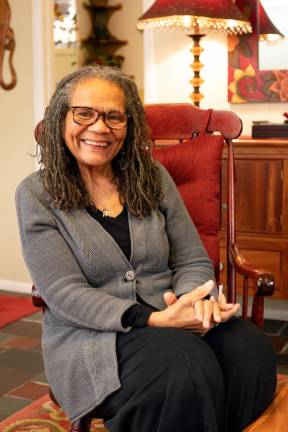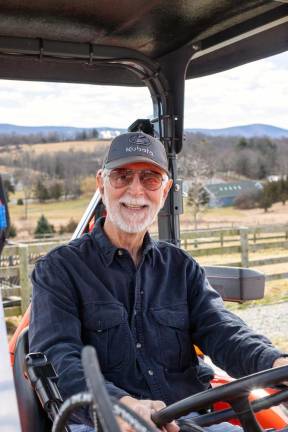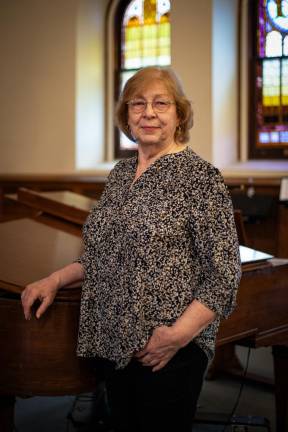The Back Seat manifesto: a dozen meditations on the view from north of 70



Aging is a hot topic. There’s presidential politics, larger issues of memory loss, and just the numbers. America’s aged population has grown by 38 percent since 2010, compared to an increase of 2 percent for the under-65 demographic. Also, the birth rate has been falling and life expectancy rising. So it’s a big deal. American culture is, once again, facing changes.
Being older is not really like being an older younger person. There really are changes taking place. Health and employment are obvious, but there are a few more. Susan Cain, author of Quiet, talks about “intrinsic maturation” — that our personalities can broaden, become more balanced, perhaps mellow naturally, as we age. Many, though not all, elders tend to become more emotionally stable, a bit quieter and more self-contained, needing less socializing and excitement to find contentment.
My brother calls this his “hermit time.” It’s connected to a change in the experience of time itself. Yes, there is more of it, and less of it. Some people feel the pressure to focus on that “bucket list,” the things undone. Others see this as a quiet time to let old deep stories and characters resurface. All this is happening at once, and it’s all changing. I asked a dozen people from around Orange County, NY, 70 and over, about how they make sense out of things these days. I wondered if they’d felt sidelined or put in the “Back Seat.” I have in recent years and have learned to discover a new, rich, unexpected life back there. Most people I talked to did not seem to like that image. It did not reflect the level of curiosity, interest and capability they all had or wanted to have. It seemed like a defeat.
Family seems to be a backdrop for everyone. For some it’s still white-knuckled driving, feeling useful, helpful, learning new skills, finding jobs; others are taking side roads, breaks, “changing vehicles”; others continue enjoying the mellowing continuity of lifelong habits. Still others see the new world of challenges and lead with their curiosity to explore the unknown qualities of this Third Age, in this Back Seat.
Jim Neujahr, Warwick, 83
I like the image of moving to the “sidecar” – no responsibilities for driving, but still up front and experiencing. And then as soon as one of the kids or grandkids has problems, you find you are driving again in terms of how you will use your time and resources.
- Neujahr is a community activist and a former college science professor who is active in church service projects
Penny Steyer, Warwick, 73
I am no longer the 29-year-old I remember and even feel like. I wonder where she went. I haven’t fully moved to the Back Seat – but am aware that in many ways others are in control of things I never anticipated giving up, from driving to Instacart to getting to health appointments.
- Steyer is a former corporate communications executive, community volunteer and former manager of the Warwick Farmers Market
Karen Washington, Chester, 70
I find I listen more, not to my own beat but the beat and voices of others. You are no longer controlling but sharing your knowledge and life’s experience. It’s now more a two-way street. Time is a bit different. Days seem faster, so there is little time to sulk and procrastinate, but more time to spend with loved ones and to appreciate life and this great planet.
-Washington is an activist and farmer at Rise & Root Farm
George Opper, Warwick, 74
I didn’t retire until I was 70½, so the difference from a working life to a retired life was anticipated. I don’t consider myself in the Back Seat as I still am responsible for running the household as well as continuing with the activities I have been involved with. I have gone back to work part-time, three hours a day.
- Opper, who worked in accounting in a medical institution, is a 50-year veteran of the volunteer fire department and active in his church
Robert Agnello, Warwick, 70
I like the term Vintage because after retirement I’m still in the driving in the Front Seat even though I have no particular place to go. Must motivate myself to dress up and go out instead of staying home with just busy work. My mom is 95, I’m dealing with her declining health.
- Agnello was a set designer at Good Morning America
Jeff Ciampa, Warwick, 72
I do enjoy not steering the car all the time, being a more passive guest, allowing more observation... and never the back seat driver! I have progressed from raising and teaching children to simply entertaining children and grandchildren, observing the subtlest changes as they occur over time. I seem to talk less and listen more closely. Things have remained fairly constant for me as an artist: practicing, writing, teaching, performing, recording. Also, I do yoga, meditation, walking, bicycling, cooking, reading and traveling.
- Ciampa is a jazz guitarist and teacher
Allen Clarkson, Warwick, 79
Not sure I went to the Back Seat as much as started riding in a different car. Or the Kubota tractor I love using. There is a tug between relaxing and letting time go by, versus feeling all the limited days I have are precious. I have become a rabid consumer of political news and do a little political action with local groups.
- Clarkson has a 7-acre horse farm
Zoey Savale, Greenwood Lake, 74
I like the image of new shoes versus old shoes. New shoes are attractive, they keep their shape, and they may hurt in some places but the discomfort is worth it. Even when shoes are old and deteriorating, they are wonderfully comfortable and, in many ways, better than ever... until they finally fall apart. Youth did include some pain with the joy. Age may not be pretty, but it’s ‘broken in,’ and remarkably comfortable, at least for now.
- Savale is director of the Warwick Chorale and a former teacher
Donna Haley, Warwick, 76
I have always been in the Front Seat and continue to be so. If your hands are on the wheel, you know where you’re going. My energy and determination seem even more robust now, more focused and laser-like than ever. Currently, my images of aging have to do with fulfillment, art, desire, learning and teaching, curiosity, surprise, experimenting, reaching my human potential, if that’s possible. It has nothing to do with retiring. It is rather, reinventing. One just has to keep on creating.
- Haley is an artist and art teacher
Barry Cheney, Warwick, 74
I relate to the Back Seat image, mostly within the family where my adult children have changed focus to their children, changing my relationship as a parent. The focus is now on the grandkids. My parents did an excellent job demonstrating how to stay active and be involved after they retired; I have followed their example. I continue to find meaning in what I do which gives me the opportunity to stay involved and contribute to my community.
- Cheney is Deputy Mayor Village of Warwick and member of the Orange County Legislature
Beverly Braxton, Warwick, 77
I thought about the nearing the end of our lives as we enter our seventies and eighties and the importance of asking ourselves if we have given voice to what lives inside us, the unique quality of our lives that defines our specific ‘being’ and its expression in this world we are currently residing in.
I am in my late seventies now and I can honestly say I’ve not felt this alive at any other stage of my life and of course I have to ask myself, why now? And I believe the answer has to do with the constant reminder that my life is nearly over and I do not want to be on my deathbed thinking of a life unfulfilled.
In this present time, I care deeply to experience myself living in an authentic way, giving voice to what I truly believe and what matters to me, allowing the possibility of who I really am to become visible and no longer hidden and fearful of being judged. And in doing so, I see there are curiosities that I am allowing to be visible to me and I am giving myself permission to explore. Before this time I had not the courage to do so publicly and I am loving the journey.
I am loving the journey because as I grow older and settle down into a less busy lifestyle I am more able to sense and trust what is truly being called forth in me. Oftentimes, what is being called forth leads me to see what is needed to heal myself, my family and what can foster healing in my community. For me this is truly energizing. This is the emotional soil from which Family Central NY and We the People sprouted. I find as I grow older I am ever vigilant to give expression to my deepest longings for fear that in the end if overlooked they will be my deepest regret.
- Braxton is a retired teacher and community activist
Fred Buell, Tuxedo, 81
The image of moving from the Front Seat of daily living to the Back Seat doesn’t quite work for me. Aging certainly does change things, but it’s more like getting out of the car. If driving means going somewhere you choose and doing so with you at the steering wheel controlling it and with your foot on the accelerator, aging, to me, means none of these things. Control fades with aging: with a recognition of being in a body that more and more determines you rather than vice versa, and with an awareness of being in a different position in society. Desire for acceleration lessens, as you realize how much you stand to miss by going fast. None of these changes in aging are easy. But having bucket lists, gritting teeth against any suggestion of retiring and the loss of status that often accompanies it, doesn’t work. Most of all, getting to a goal is totally gone. Younger, you had tons of important long-term goals and ambitions — in career, doing something you yearned to attain; in love and family, to help your children to thrive in the world beyond their nest. Instead, in aging, love means paying ever deeper attention in the present, and ambition looks silly. Yes, people often do great things in their retirement, but not because they want to get somewhere they’re not, but something they feel urgently needs to be done for the world.
An expansion of empathy is perhaps the biggest gift aging can bring. The more people you can feel yourself into the more your life enlarges, rather than shrinks.
Another gift is revisiting moments in your past that remain luminous. True, memory is often unpleasant — the memory of things you regret, sometimes fiercely, because you missed them, or did them, or had them done to you. You must make the going back to these a shedding to reveal what you really cherish: how there were, and still are, moments in every day, week, month, year when your inmost self draws its deepest, most unforced breath.
- Buell is a poet, retired college teacher and photographer
So, elders are mostly out of the active, career workforce which often makes them seem marginal. Yet they still have the core human need to “belong” somewhere, asking the basic human question: How can I be regenerative for myself, my family and my community?
It’s about where and how meaning is found and refound. The answers are subtle, varied, and at times elusive, as health, finances and interests change. We look for moments of happiness, joy, awe, often provided by contact with family, friends and the natural world. At the same time, Nature reminds us of another deep need: for the feral, to experience contact with some level of risk or danger. Our bodies are another important center of need: what we put into them, how they work. We all seem to have the need to make something, as an engineer, artist, mechanic, shopkeeper, cook. Finally, we all want to tell our Story: Who we are, how we got here, what happened to us. That keeps us in contact with others. We tell our story; we listen to theirs.
So, dear Reader? How’s your Back Seat? I’d like to hear your experience, your version of this: rustic@warwick.net.
It’s happened ever so slowly. Not unlike rust, mold, erosion, moss, warts. Small annoying changes, quite easy to look past. So, here I am in the back seat. The Back Seat, where stuff gets put; where the kids are buckled in, the dog rides, the groceries put, the dooly uncles often ride, where “that odd smell in the car” is often discovered.
Once you’re in the Back Seat, it’s surprisingly larger than it looked. More like a large waiting room, or a long bus. I only saw this after being there a few years and learning to squint. There’s a check-in area run by a few older people: a lady, Hestia, a crippled guy, Hephaestus and a guy, Hermes, with a cool winged hat. They seemed to have been there a long time. I tried to start up a conversation and they just looked at me. I didn’t feel totally safe. There were noises and smells and lights I didn’t recognize. And there were panhandlers. The guy next to me waved at me to stay away. “Those are the “Near Enemies” he said. I had to go to a Buddhist dictionary to understand. They are something like tricksters, seeming all friendly and helpful, but dealing with them, you feel drained. Like when you just want to wander, and they show up to convince you take a Walk and count your steps, or better yet, a Hike. Always with the better way. Near Enemies have something to do with clickbait: fast, luscious prattle. There were lots of older people like me, but a lot were younger, “different.” Many sat in corners under big signs: OCD, ADD, HIV, DOA, PTSD.
It’s Kairos here in the Back Seat. Kairos is that older, other, hovering sense of how time works. We have a pretty well-rooted sense of time as “Father Time,” – Chronos. It’s comfortingly linear, with a clear Past, Present and Future. It teases (and traps) us into longing for the Good Old Days and a Brighter Future. That often provokes sadness, resentment, disappointment and anger. Cheap, available, low-octane, emotional fuels.Kairos is quite different. Here in the Back Seat, time is pretty fluid: Memories and Plans blend, maybe pleasantly; not much worry of being on the spectrum or loss of faculties you hear so much about in the Front Seat. The concepts of before and after are quaint, and sweetly inaccurate to Back Seaters. Time is all-at-once, bubbling, reaching out backwards, forwards, sideways. Hard to see it all! There’s a vitality and unpredictability we’re so unused to. Again, try to imagine the life, the consciousness of someone under age 2. His experience of time, space, cause, effect... Welcome to the Back Seat! More a portal than a place. Kairos? It’s about quiet values of waiting, listening, pondering. Not much utility, clarity, taxonomy; but some. It’s sometimes call “5D,” Second Self world, waved off as irrational, illogical, shadow-lit, lots of dark, musty corners; foggy, surreal. Buddha was onto it, with that tattoo of hers: “Things are not what They seem nor are they otherwise.” Leaving a trail of ambiguity, people muttering: what was that? We need a new messiah: preaching the comfort, the wisdom, the importance of the inexact, the impermanent.
Yes, it’s quickly diagnosed as loss, but that’s not the first, best or only way to describe it. It involves being more selective, discriminating, perhaps a sensibility for the indirect, background rhythms. Being alert now seems a value of the young. Alert? Alert for what? Reality shifts, wiggles, shimmers into a helix of arbitrary, more and less interesting customs, conversations and people. (I recently experienced, in five minutes, what seemed like a four-hour seminar in restoring vintage Morgan automobiles) Selecting and sorting, editing, pruning are new self-protective skills. Shamans offer tools to trim out such calloused stuff. They are “Cord Cutters” for sorting, severing relationships that only present the illusion of vitality; in practice, they have come to drain, weaken you. Time to move on. Ask: Where, when, with whom do you find meaning, contentment? Has that shifted during your life? What about your new emerging ways. Make room for them! We may be seen as rude and curt, but it’s really growth. And, how best, now, to use your gifts, experiences in service of the wellbeing of our self and others? What can we do and be witness to at this time in our life and at this time in the arc of our eco-culture? May be less of an urge to combat, to polarize, to point out the mote in the eye of the Other, to repeat and revitalize grudges, to unwittingly participate in the culture of autocracy. Keep asking, not telling people about the “problem.” Be open to the thoughts and answers of others.